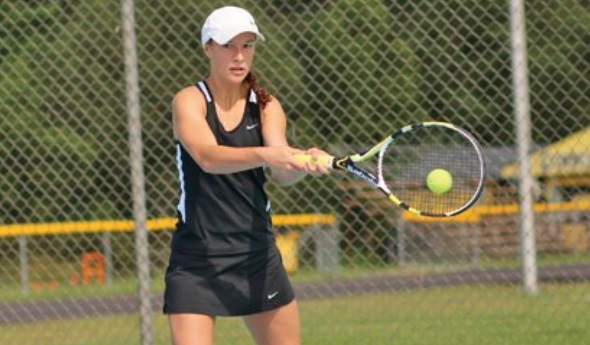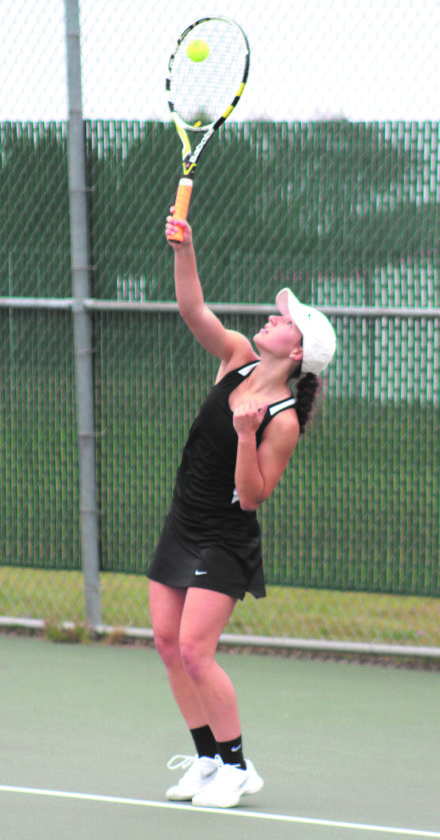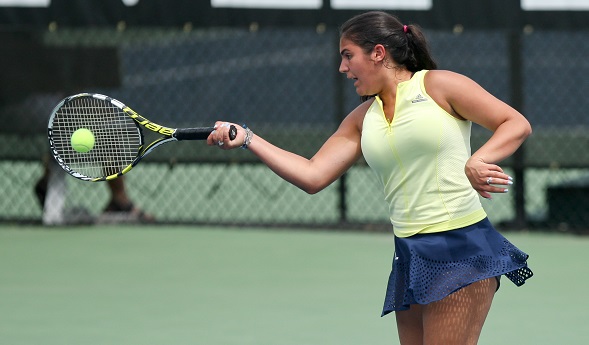
Performance: Munising's Marissa Ackerman
October 6, 2017
 Marissa Ackerman
Marissa Ackerman
Munising senior – Tennis
Ackerman capped her second straight undefeated season with the Upper Peninsula Division 2 championship at No. 1 singles. She defeated every No. 1 singles player in the Upper Peninsula this season and lost only one set, in her semifinal, during the Sept. 27 Finals to earn the Michigan Army National Guard “Performance of the Week.”
A five-sport athlete, Ackerman also plays libero for the volleyball team during the fall, basketball and then softball and runs track in the spring. She was 13-0 on the tennis court this season, following a 13-0 junior year as a No. 2 singles champion and a 10-1 sophomore campaign where her only loss came in the U.P. Finals also at No. 2. She finished her four-year varsity career 42-7 playing no lower than No. 2, and did so while Munising played all of its matches on the road as it doesn’t have home courts. Her school, in Class D with just more than 200 students, plays tennis in the Great Northern Conference with the U.P.’s biggest schools, and she won the No. 1 singles league title as well. The Mustangs won two U.P. Finals team titles during her career, in 2015 and shared with Ishpeming Westwood in 2016.
 Ackerman was followed in the singles lineup by twin sister Kelsea, and they’ve pushed each other to be better both in sports and in the classroom – the pair both have grade-point averages near 3.9. Marissa has an opportunity to play basketball at the college level but isn’t sure if she wants to continue in that sport or tennis. She’s also unsure what she’ll study after high school, although the medical field appears to be calling: her sister wants to be a nurse, her brother is studying physical therapy, her mom is a dietician at the local hospital and her dad is a nurse and director of the intensive care unit at the hospital in Marquette. Ackerman is interning at the hospital currently and considering becoming a physical therapist or athletic trainer.
Ackerman was followed in the singles lineup by twin sister Kelsea, and they’ve pushed each other to be better both in sports and in the classroom – the pair both have grade-point averages near 3.9. Marissa has an opportunity to play basketball at the college level but isn’t sure if she wants to continue in that sport or tennis. She’s also unsure what she’ll study after high school, although the medical field appears to be calling: her sister wants to be a nurse, her brother is studying physical therapy, her mom is a dietician at the local hospital and her dad is a nurse and director of the intensive care unit at the hospital in Marquette. Ackerman is interning at the hospital currently and considering becoming a physical therapist or athletic trainer.
Coach Rod Gendron said: “Marissa is one of the most competitive players I have coached. She plays to win and is all business on the court. Marissa knows when to play offensively, but understands how to use her extraordinary defense skills. To win a point against Marissa, you will need to hit several great shots, but that ball will keep coming back over and over. She literally wears opponents out mentally and physically. I admire how she can take a player’s strength away during a match. She forces players to over-hit, because they think they have to hit better and harder shots to win each point, which plays into her strategy. Marissa is athletic and agile on the court. She is a dual-sport athlete in the fall playing volleyball too. Plus, she starts on the basketball team, and runs track and plays softball in the spring.”
Performance Point: “During the finals, I knew it was going to be a hard match because last year the number one girl that played for us (Frankie Mattson) beat the girl I played (Iron River West Iron County’s Katarina Serbentas) for the finals, and she was pretty good so I was nervous about that,” Ackerman said. “I had a bye the first round and I had to get over playing against Ishpeming (in the semifinal), and I started off really slow and really nervous. Me losing that (second) set and going into a third set, it really showed me you have to work to get what you need to get done and that anybody can beat you if you’re having an off day. After I beat (Ishpeming) I was telling myself, ‘You need to step up your game and really get focused.’”
5-sport scholar: “You really have to be on your game whether it’s sports or school. On the buses a lot of us would be studying with each other or helping each other with homework. Definitely, homework is first and sports are second. We’d always have school and then practice, and then usually after practice my sister and me go home and study. We have a really busy day, but I really don’t like not doing anything, sitting around, and it keeps me active and always having something to do.”
 Sisterly assistance: “We get really competitive. I’m really defensive (in tennis) and she is very offensive, so she has a lot of winner shots on me. But there’s a lot of shots where she thinks she has a winner and somehow I get it back. She’s a great challenge to play with. We started tennis with my grandma (Munising assistant Claudia VanLandschoot) when we were at least 3 or 5, and it just stuck. Having somebody always there with you – and we always want to get better at whatever we’re doing whether it’s basketball, tennis, any sport that we play – we always compete to get better. And by pushing each other, we know we’re going to get better.”
Sisterly assistance: “We get really competitive. I’m really defensive (in tennis) and she is very offensive, so she has a lot of winner shots on me. But there’s a lot of shots where she thinks she has a winner and somehow I get it back. She’s a great challenge to play with. We started tennis with my grandma (Munising assistant Claudia VanLandschoot) when we were at least 3 or 5, and it just stuck. Having somebody always there with you – and we always want to get better at whatever we’re doing whether it’s basketball, tennis, any sport that we play – we always compete to get better. And by pushing each other, we know we’re going to get better.”
Net gains: “I definitely see myself as very confident in volleyball and tennis, more so in tennis because it’s an individual sport. But for volleyball I play back row libero, so I have a huge part in our team and how we execute our plays. One bad pass could lead to not setting up our executions right. That same focus I have during tennis is always with me during volleyball, during matches.”
Good and bad of good-bye: “It’s really heart-breaking to see all the years of tennis just go by. It’s crazy how fast the whole season goes, and I’m really happy about the outcome and my team. But (having only volleyball left this fall) makes it easier on my body. I was super tired and exhausted and sore, and now I’m just sore in my legs from volleyball. … I’m happy I have more recovery time in my body, but at the same time I’m super sad tennis is over.”
- Geoff Kimmerly, Second Half editor
Every week during the 2017-18 school year, Second Half and the Michigan Army National Guard will recognize a “Performance of the Week" from among the MHSAA's 750 member high schools.
The Michigan Army National Guard provides trained and ready forces in support of the National Military Strategy, and responds as needed to state, local, and regional emergencies to ensure peace, order, and public safety. The Guard adds value to our communities through continuous interaction. National Guard soldiers are part of the local community. Guardsmen typically train one weekend per month and two weeks in the summer. This training maintains readiness when needed, be it either to defend our nation's freedom or protect lives and property of Michigan citizens during a local natural disaster.
Previous 2017-18 honorees:
September 28: Minh Le, Portage Central soccer - Read
September 21: Olivia Theis, Lansing Catholic cross country - Read
September 14: Maddy Chinn, Pontiac Notre Dame Prep volleyball - Read
PHOTOS: (Top) Munising's Marissa Ackerman returns a volley during a match against Gwinn this season. (Middle) Ackerman connects during her run to the No. 1 singles title at the Great Northern Conference tournament. (Photos by the Marquette Mining Journal.)

Country Day Near-Perfect in Repeat Run
June 3, 2017
By Geoff Kimmerly
Second Half editor
KALAMAZOO – There were cheers and congrats after the final match at Saturday’s Division 3 Finals at Kalamazoo College.
On the other side of the net, Detroit Country Day’s tennis players mostly were speechless as senior Sasha Hartje pulled aside a teammate to tell her it was OK.
The Yellowjackets had fallen in the final match of the day. But they’d won the first 39 of the weekend. So for the veteran Hartje, surrounded by mostly younger teammates, it was an understandable but still weird scene – one point shy of perfect was still perfect enough for the repeat champions.
“Nobody’s going to remember this one match we lost. They’re going to remember that we won 39 out of a possible 40 points, and that’s unbelievable,” Hartje said.
“We’ve never done this well, collectively, as a team. And we’ve never been as bonded as we are as a team this year, so it was unbelievable my senior year to be this close with all my teammates and to win this – and I got to win with my sister, which was super exciting for me.”
Country Day cleared the field by 16 points after last season winning the Lower Peninsula Division 3 title by only one.
It’s fair to say this was expected. All eight Yellowjackets flights entered Friday’s first round as top seeds. Sophomore Monique Karoub, senior Sadina Fadel and freshmen Nina Khaghany and Alexis Nardicchio swept Nos. 1-4 singles, respectively, without losing a set.
On the doubles side, Hartje and her sophomore sister Elle gave up only two games on the way to their win. Junior Heather Zimmerman and sophomore Tara Rahmani at No. 2 and juniors Jenna Lee and Maya Nassif at No. 4 also made it through their brackets without giving up a set.
That left the No. 3 doubles final as the last match of the tournament. The crowd gathered anticipating that another Country Day win would give the team the first perfect score in MHSAA Tennis Finals history.
But after winning the first set on a tie-breaker and then dropping the second 6-2, Bloomfield Hills Cranbrook Kingswood seniors Francis Dube and Ava Harb put the finishing touches on a second straight flight championship by claiming the third set 6-2. Dube and Harb had won the No. 4 doubles title in 2016.
Still, Country Day’s 39 team points tied Cranbrook Kingswood’s 2013 team for the most at a Girls Tennis Final in at least a decade.
“Obviously we want everyone to win just because they feel better when they win. But we’re proud of everyone, and 3 doubles, they played a really tough match and fought all the way through,” Country Day coach Jessica Stencel said. “It’s hard being the only team that doesn’t come out on top, but they still got second. I think that’s pretty great too. And 39 out of 40, I think that’s a pretty solid year.”
It had an interesting start. Hartje, last season’s champion at No. 1 singles and the runner-up in 2015, suffered multiple ankle sprains playing an early game for the soccer team and had to miss six weeks for recovery.
By the time she returned, she said, it didn’t make sense to challenge for her former spot atop the singles lineup – so instead she joined her sister at No. 1 doubles and helped Elle earn a second straight championship at that flight.
 “We’re really lucky that Monique (Karoub, who won No. 2 singles in 2016) is equally as talented. She finished barely losing any games in this entire tournament,” Stencel said. “Sasha is so talented and really helped us out at No. 1 doubles, and the whole way from top to bottom they did really well this year.”
“We’re really lucky that Monique (Karoub, who won No. 2 singles in 2016) is equally as talented. She finished barely losing any games in this entire tournament,” Stencel said. “Sasha is so talented and really helped us out at No. 1 doubles, and the whole way from top to bottom they did really well this year.”
So did Grand Rapids Christian, the runner-up for the second straight season – but this time in a self-admitted surprise. The Eagles graduated seven from the team that just missed winning a year ago, and had only two senior starters and three freshmen in the doubles lineup.
Senior McKenzie Moorhead (No. 2 singles), juniors Maria Poortenga (No. 3) and Emily Schellenboom (No. 4), and freshman Maya Barbee and junior Anna Cole (No. 4 doubles) all finished flight runners-up.
“You just try to go with a good core. We had a great set of leaders at the top, Leah (Newhof) and McKenzie as number one and two singles players, and when you have that luxury of great players at the top, you really look to make sure your depth is good,” Grand Rapids Christian coach Tim Morey said. “That’s where we kinda made our money. … We really looked to build with some youth. We have three freshmen and a few juniors, and we have a really nice mix that allowed us to have the depth we needed to be successful when we got to the state finals.”
Adding to the historic nature of this tournament was Imlay City senior Grace Whitney. She advanced to the championship match at No. 1 singles before falling to Karoub 6-0, 6-1, to end a mighty rise among the state’s elite.
As a freshman, Whitney was the first player from her school – girls or boys – to qualify for the MHSAA Tennis Finals. Last spring as a junior, she advanced to the No. 1 singles semifinals as the fifth seed. She entered this weekend seeded second.
“I’m from a small town and there’s not a lot of people who go do great big things, so it really means a lot,” said Whitney, who will play next season at Wright State University in Ohio. “And all the people in my town all support me.”
PHOTOS: (Top) Detroit Country Day No. 2 singles player Sadina Fadel connectsduring Saturday's finals rounds at Kalamazoo College. (Middle) McKenzie Moorhead returns a volley on the way to finishing runner-up at No. 2 singles for Grand Rapids Christian. (Click to see more from HighSchoolSportsScene.com.)

